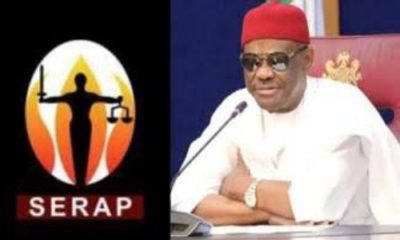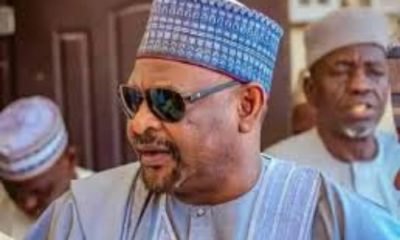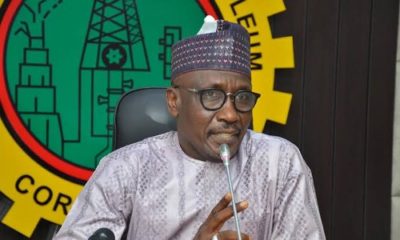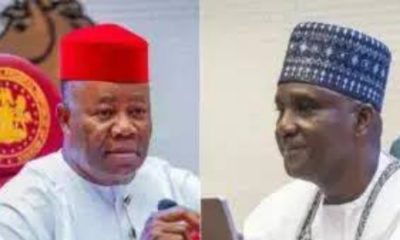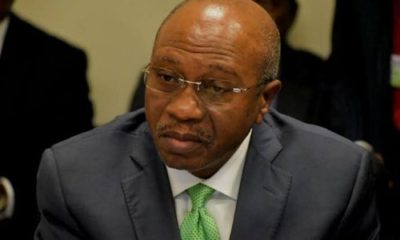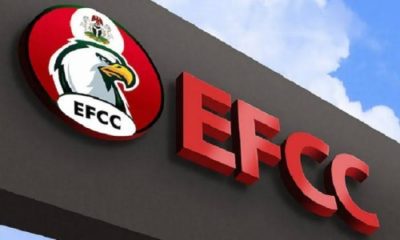Communication
SERAP Asks Court To Stop Buhari, Others From Shutting Down TV Stations
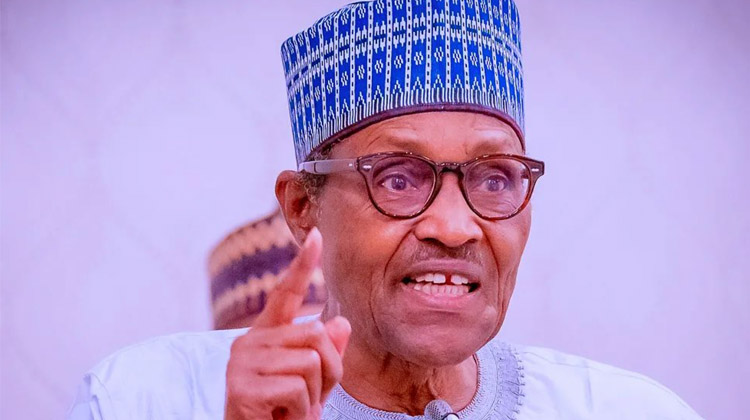
Socio-Economic Rights and Accountability Project (SERAP) has filed a lawsuit against President Muhammadu Buhari and the National Broadcasting Commission (NBC) for “the arbitrary use of the NBC Act and broadcasting code to sanction and threaten to revoke the licences of broadcast stations in the country and shut them down over their legitimate coverage of the 2023 general elections.”
Joined in the suit as Defendant is Mr Lai Mohammed, Minister of Information and Culture.
The NBC had last week, reportedly sanctioned 25 broadcast stations and issued ‘final warnings’ to 16 others for allegedly violating provisions of the Nigeria Broadcasting Code during the February 25, 2023 Presidential and National Assembly elections.
But in the suit number FHC/L/CS/469/2023 filed last Friday at the Federal High Court, Lagos, SERAP is asking the court to determine “whether the broadcasting code used by the NBC to sanction some broadcast stations and threaten to shut down others is not in inconsistent and incompatible with freedom of expression, access to information and media freedom.”
SERAP is asking the court for “a declaration that the sanctioning of some broadcast stations and threat by the NBC to revoke the licences and shut down other stations for their lawful coverage of the general elections is unconstitutional and unlawful, as it violates freedom of expression, access to information and media freedom.”
SERAP is also seeking for “an order of interim injunction restraining President Buhari, the NBC and Mr Mohammed from threatening and sanctioning broadcast stations in the country simply for carrying out their constitutional duties, pending the hearing and determination of the motion on notice filed contemporaneously in this suit.”
In the suit, SERAP is arguing that: “It is a travesty of justice to punish and threaten broadcast stations seeking to promote election integrity and citizens’ engagement and participation, while allowing perpetrators of electoral violence and grave human rights violations escape accountability for their alleged crimes.”
According to SERAP, “Rather than promptly investigating allegations of election-related violence and other infractions of the Electoral Act and the Nigerian Constitution, and going after suspected perpetrators, the Nigerian government is scapegoating the media by targeting and punishing broadcast stations.”
SERAP is also arguing that, “the use of NBC Act and Code in this case would open the door to arbitrariness and fundamentally restrict freedom of expression that is an integral part of the public order protected by the Nigerian Constitution and human rights treaties to which Nigeria is a state party.”
The suit filed on behalf of SERAP by it’s lawyers Kolawole Oluwadare, Ms Adelanke Aremo, and Ms Valentina Adegoke, read in part: “The media plays an essential role as a vehicle or instrument for the exercise of freedom of expression and information in a democratic society.”
“The NBC legislation and codes do not confer unfettered discretion for the restriction of freedom of expression and media freedom on those charged with their implementation.”
“The sanctioning of some broadcast stations and threat by the NBC to revoke the licences of others and shut them down is neither necessary nor proportionate, as it would unduly intrude upon Nigerians’ right to freedom of expression, access to information, and media freedom.”
“The use of vague and undefined phrases such as ‘unpatriotic individuals’ ‘subversive, hateful, and inciting utterances, particularly post-election’, as grounds to sanction and threaten to broadcast stations is inconsistent and incompatible with human rights requirements.”
“The Nigerian Constitution and human rights treaties impose legal obligations on the Nigerian government to refrain from imposing restrictions which are not consistent with human rights requirements, including on discussion of political and election-related issues.”
“It is also inconsistent with constitutional and international human rights requirements to sanction and threaten broadcast stations solely for their coverage of the issues around the general elections on the basis of vague phrases such as ‘unguarded statements’, and ‘negative conversations’ used by the NBC.”
“The sanction and threat also represent a serious hindrance to the exercise of journalism, media diversity and independence, media freedom, and participation.”
“Media coverage of the general elections and post-election matters, and media freedom are closely connected, as access to information is an essential requirement for the realization of the rights to freedom of expression and participation.”
“Similarly, the phrases used by the NBC lack sufficient clarity and can be arbitrarily or discriminatorily applied and enforced.”
“The sanction, ‘last warning’ and threat by the NBC would seem not to meet the strict requirements of the Nigerian Constitution and the country’s international human rights obligations. In particular, it is unclear the scope or object of what these wordings seek to prohibit.”
“Under the constitutional and international requirement of legality, it is not enough that restrictions on freedom of expression, access to information and media freedom are formally stated in press releases and regulations.”
“The requirement of legality also serves to define the scope of legal discretion conferred on implementing authorities in order to provide adequate protection against arbitrary implementation.”
SERAP is therefore asking the court for the following reliefs:
- A DECLARATION that the use of the NBC broadcasting code to sanction some broadcast stations and threaten to revoke the licences of others and shut them down for covering the general elections is a violation of the rights to freedom of expression, access to information and media freedom.
- A DECLARATION that the sanction of some broadcast stations and threat to revoke the licences of others and shut them down for simply carrying out their legitimate duties of covering the general elections is a violation of the right to fair hearing as provided for under the Nigerian Constitution 1999 (as amended) and human rights treaties which Nigeria has ratified.
- A DECLARATION that the arbitrary action by NBC to sanction some broadcast stations and threaten to revoke the licences of others and shut them down for covering the general elections is a violation of section 39 of the Nigerian Constitution 1999 [as amended], and Article 9 of the African Charter on Human and Peoples’ Rights (Ratification and Enforcement) Act.
- AN ORDER compelling President Buhari to direct the NBC and Mr Mohammed to withdraw the sanction and threat against broadcast stations and to comply with the provisions of section 39 of the Nigerian Constitution, and Article 9 of the African Charter on Human and Peoples’ Rights (Ratification and Enforcement) Act.
- AN ORDER OF PERPETUAL INJUNCTION restraining President Buhari, the NBC, and Mr Muhammed whether jointly or severally or any other authority, person or group of persons from unilaterally sanctioning and threatening to revoke the licences of any broadcast stations and shutting down the stations on the grounds of covering the 2023 general elections.
No date has been fixed for the hearing of the suit.
Communication
Nigeria’s Telecom Market Eyes $11.43bn Value By 2029

In a significant market projection, Mordor Intelligence predicts that the Nigerian telecom sector is set to surge to a value of $11.43 billion by 2029.
The report anticipates a steady growth trajectory with a cumulative average growth rate (CAGR) of 4.70% between 2024 and 2029, based on the current market value of $9.09 billion.
The transformation of Nigeria’s telecom landscape, fueled by government initiatives to boost internet infrastructure and broadband connectivity, coupled with rising data consumption, 5G deployments, and innovative strategies from major telecom players, is expected to drive this substantial market expansion.
The report underscores additional factors propelling the growth of Nigeria’s telecom sector, emphasizing the surge in smartphone adoption.
the report said “Increased smartphone adoption in Nigeria has fueled the development of a dynamic digital services sector. Currently, millions of Nigerians use mobile apps, including social networking sites, e-commerce, and financial services.
“These apps could leverage smartphones’ capabilities to offer speed, convenience, and efficiency, encouraging more people to invest in smartphones.
“In addition to these expansions and collaborations, the growing adoption of digital technologies and government support in aiding the same alongside the 5G technology implementation across the country is analyzed to boost the demand for telecom towers significantly.”
“In addition to these expansions and collaborations, the growing adoption of digital technologies and government support in aiding the same alongside the 5G technology implementation across the country is analyzed to boost the demand for telecom towers significantly.”
Mordor Intelligence highlights that the flourishing e-commerce and digital service platforms in Nigeria are significant drivers behind the escalating demand for dependable telecom services in the country.
Communication
MTN Set To Partially Disconnect Glo Network

The Nigerian Communications Commission (NCC) has granted MTN’s request to partially disconnect Globacom (Glo) from its network owing to unsettled interconnect charges.
Reuben Muoka, the NCC’s Director of Public Affairs, disclosed this in a document named ‘Pre-Disconnection Notice’ on Monday.
The move follows Glo’s persistent failure to clear its outstanding debts despite multiple attempts to resolve the issue.
Under this partial disconnection, Globacom subscribers will solely receive calls from MTN users, while retaining access to other network services like outgoing calls to other networks and data services.
However, they won’t be able to initiate calls to MTN users during this period.
The statement read, “All subscribers are, therefore requested to take notice that the Commission has approved the Partial Disconnection of Globacom to MTN in accordance with Section 100 of the Nigerian Communications Act, 2003 and Paragraph 9 of the Guidelines on Procedure for Granting Approval to Disconnect Telecommunications Operators, 2012.
“At the expiration of 10 days from January 8, 2024, subscribers of Globacom will no longer be able to make calls to MTN but will be able to receive calls.
“The Partial Disconnection, however, will allow in-bound calls to the Globacom network,” it added
Communication
Despite Hardship Nigerians Spent N3.33tn On Calls, Data In 2022
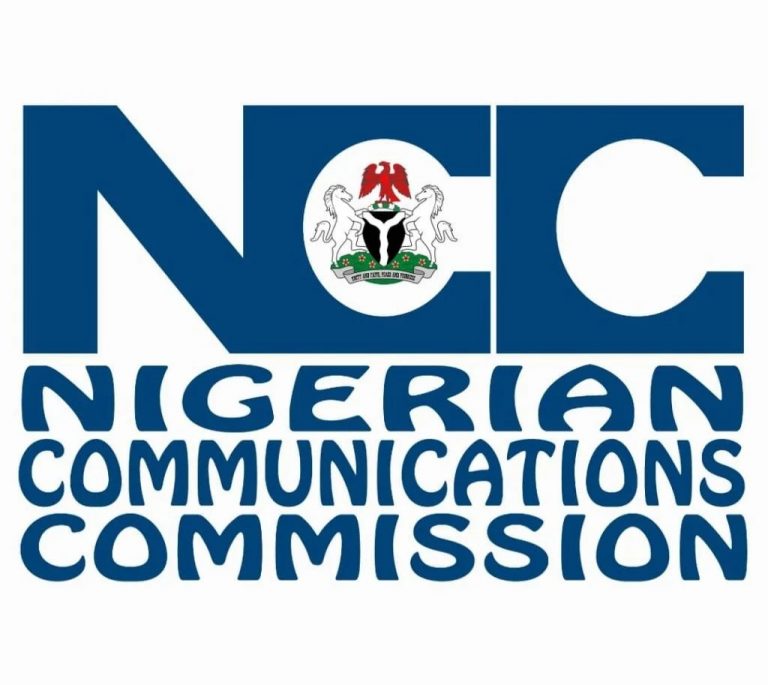
Nigerian telecommunication users, along with others within the country, expended a total of N3.33 trillion on various telecom services such as calls, data, SMS, and more throughout 2022, according to the Nigerian Communications Commission (NCC).
This information comes from the recently published ‘2022 Subscriber/Network Data Annual Report’ by the NCC, which also revealed that telecom companies generated N3.33 trillion in overall revenue for that year.
The report further highlights a noteworthy growth of active voice subscriptions, rising from 195,463,898 subscriptions in 2021 to 222,571,568 by December 2022, marking a 13.86% year-on-year increase.
Commenting on the increase, it said, “The increase in the Operators’ subscriber base was attributed to a number of reasons which includes subscriber loyalty, promos, seasonal effects, aggressive consumer acquisition drive, and competitive product offerings across all the networks.”
It noted that the growth in active subscriptions impacted positively on other derived telecom indicators such as teledensity, Internet penetration as well as broadband penetration.
Data usage also continued its surge in 2022. It increased by 46.77 per cent to 518,381.78TB as of the end of the year.
The NCC stated, “There was an increase in the volume of data consumed at the year-end December 2022 when compared with the year-end December 2021.
“The total volume of data consumed by subscribers increased to 518,381.78TB as of December 2022 from 353,118.89TB as of December 2021. This represents an increase of 46.77 per cent in data consumption within the period.”

